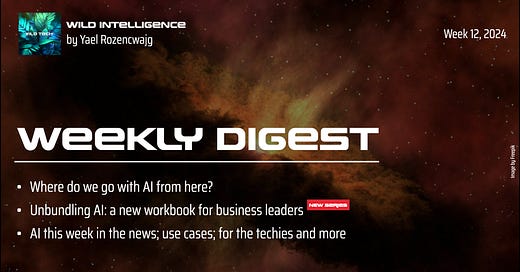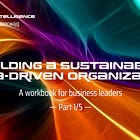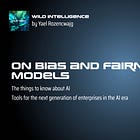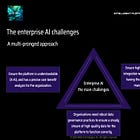📨 Weekly digest: 12 2024 | Where do we go with AI from here?
What story do we want to tell about AI and humanity? | AI this week in the news; use cases; for the techies
Hello friends,
The future of AI is a fascinating but complex question. There are two main areas of focus for AI development right now: Narrow AI (also called Applied AI), which is what we see most today. These are AI systems designed for specific tasks, like facial recognition software or self-driving cars. Continued development will likely focus on making these systems more efficient and effective. General AI (also called Artificial General Intelligence or AGI) is the more futuristic concept of AI that can learn and perform any intellectual task a human can. AGI is a much harder problem, and there's no consensus on how close we are or whether it's achievable.
Some of the questions we'll be grappling with as AI continues to develop:
Ethics and bias: AI systems can inherit biases from the data they're trained on. We need to make sure AI is developed and used fairly.
Regulation: As AI becomes more powerful, new laws and regulations will likely be needed to govern its use.
Jobs and the economy: Automation through AI could lead to job displacement in some sectors. We'll need to find ways to adapt our workforce.
Even though we see large organizations taking strides towards responsible AI, like applying AI to address social and environmental challenges, developing and deploying AI in a way that is fair, reliable, and accountable, integrating responsible AI practices into their core business, or using AI to expand access to financial services for underserved communities, do not ensure that AI is a force for good in the world and protect human values.
▸ For anything to become good at something, it has to reference and copy something. AI is already great at mimicking paintings, illustrations, marketing plans, and strategies…but it also creates.
We can see amazing creations that AI has made of paintings or music that look or sound like something that artists would have written, that look or sound original. And it will continue to get better. So, where do we go from here right now?
How do we—as human beings—feel about that? What is the purpose we look for? What do we want from AI?
We need to ensure that regulations around essence and likeness are implemented as soon as possible. We must set protection protocols for people and humanity: essence and likeness are essential to maintaining civil liberties and their communities.
That is what we should be doing. We're not saying regulations to stop innovation. We're saying regulations for people.
Just like when the automobile was invented, the Department of Motor Vehicles (DMV) wasn't around, or when the airplane was invented, the Federal Aviation Administration (FAA) wasn't already around.
But now there are vehicles on the road and airplanes in the air.
Even though AI is different, we need to ensure the safety of people and their communities, as for the DMV and the FAA.
The only way to tackle bias is to have people from different communities and backgrounds train data and write algorithms in every existing field, whether it's computer science, robotics, or programming. This will allow them to grow up and fill jobs needed to address data, biases, and algorithmic biases. That should be our common core passion.
While every school has a basketball, football, or soccer program, no engineering, algorithmic programming, or data training program is mandatory in every school, inner city, rural area, poverty-stricken area, underdeveloped community, or underserved community.
Overall, AI has the potential to be a powerful tool for good, but it's essential to be aware of the challenges as well. The future of AI will depend on the choices we make today.
What do you think?
If you haven't already, you can start with our workbook, Building a data-driven organization.
I am looking forward to reading your thoughts in a comment.
Happy days,
Yael et al.
🦾 AI elsewhere on the interweb
In this talk, A New Code for AI, Vilas explores the transformative power of AI, not as a force of disruption but as a partner in advancing human potential and solving global challenges. One highlight includes a captivating narrative on how AI can enhance our understanding and stewardship of the natural world, illustrated through the whimsical yet profound story of tipsy elephants.
♻️ AI: use cases
AWS and NVIDIA Extend Collaboration to Advance Generative AI Innovation on Nvidia
The scariest part about artificial intelligence on New Republic
AI and You: AI Summer Camps, the EU's Groundbreaking Law, a Second Look at Sora on Cnet
For the techies, research papers, and more
Top AI researchers say OpenAI, Meta and more hinder independent evaluations on the Washington Post
AI regulation in Africa on LinkedIn, post shared by Ravit Dotan
Fast access to our weekly posts
🚀 Unbundling AI
📮 Maildrop
🎯 How-tos
🎲 Data and trends
📌 AI case studies
📨 Weekly digest
You are receiving this email because you signed up for Sustainability Insights by Yael Rozencwajg. Thank you for being so interested in our newsletter!
Weekly digest are part of Sustainability Insights, approaches and strategies.
We share tips to help you lead, launch and grow your sustainable enterprise.
Become a premium member, and get our tools to start building your AI based- enterprise.
Not a premium?
Thank you for being a subscriber and for your ongoing support.
If you haven’t already, consider becoming a paying subscriber and joining our growing community.
To support this work for free, consider “liking” this post by tapping the heart icon, sharing it on social media, and/or forwarding it to a friend.
Every little bit helps!








